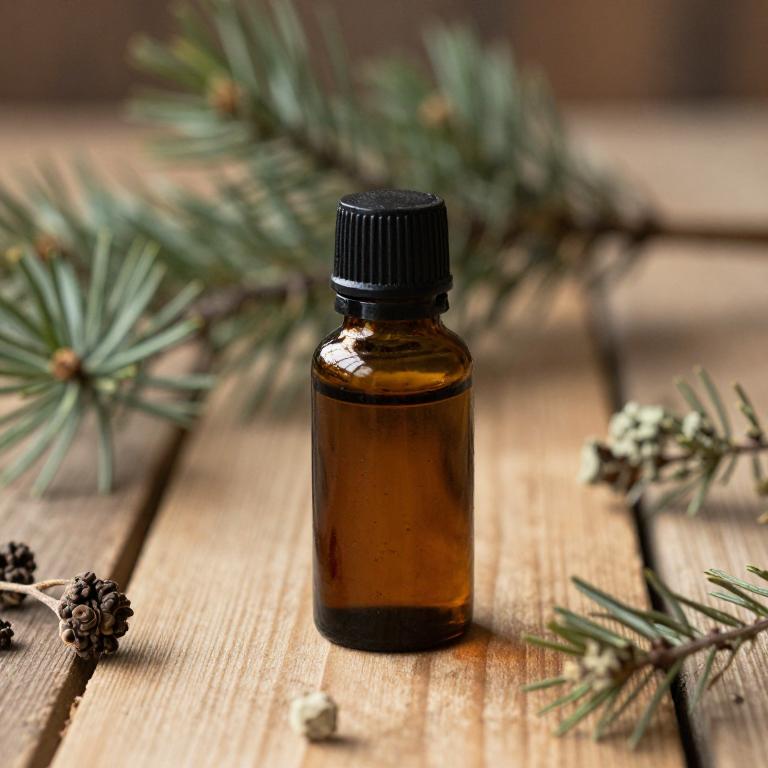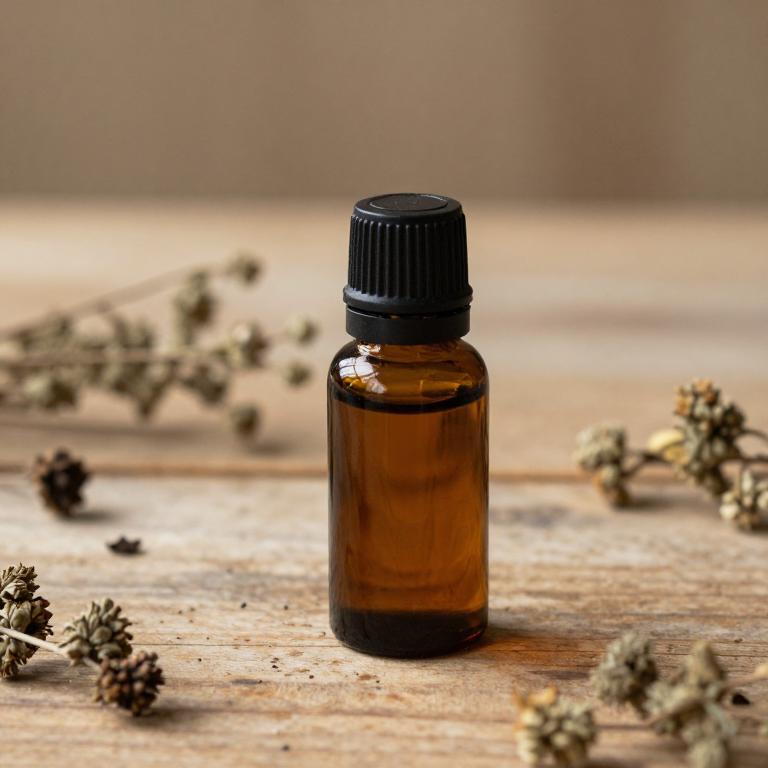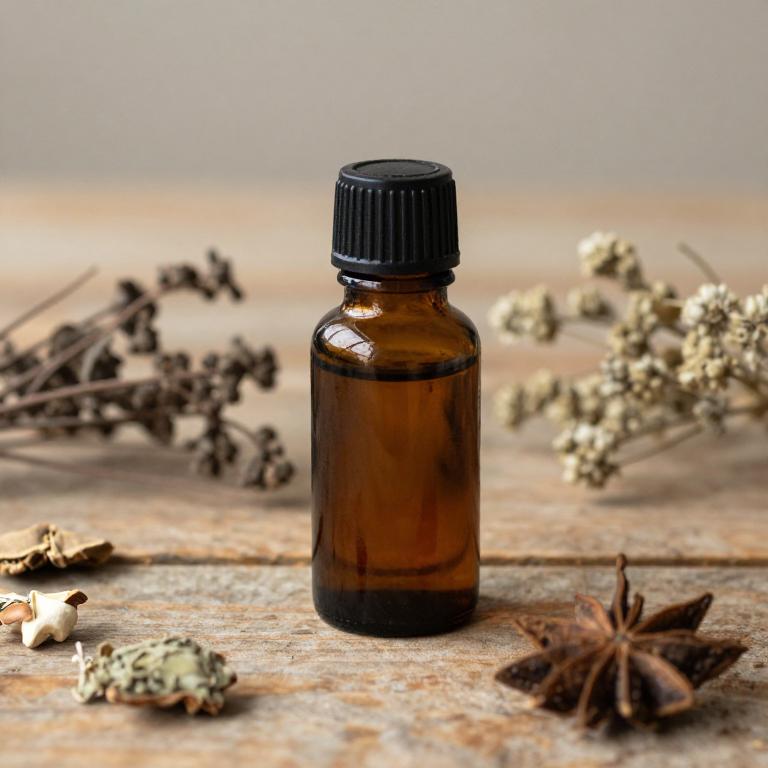10 Best Herbal Essential Oils For Dry Nose

Herbal essential oils, such as eucalyptus, peppermint, and lavender, are commonly used to alleviate symptoms of a dry nose due to their moisturizing and soothing properties.
These oils can help increase moisture in the nasal passages by stimulating mucus production and reducing irritation. When diluted properly with a carrier oil, they can be applied topically or inhaled through steam inhalation for maximum effectiveness. Many people find relief from dryness and discomfort by using these natural remedies, especially during cold weather or in dry environments.
However, it's important to consult a healthcare professional before using essential oils, especially for those with allergies or respiratory conditions.
Table of Contents
- 1. Eucalyptus (Eucalyptus globulus)
- 2. Melaleuca (Melaleuca alternifolia)
- 3. Rosemary (Rosmarinus officinalis)
- 4. Scots pine (Pinus sylvestris)
- 5. English lavender (Lavandula angustifolia)
- 6. Thyme (Thymus vulgaris)
- 7. Citrus sinensis
- 8. Ceylon cinnamon (Cinnamomum zeylanicum)
- 9. Peppermint (Mentha piperita)
- 10. Camphor tree (Cinnamomum camphora)
1. Eucalyptus (Eucalyptus globulus)

Eucalyptus globulus, commonly known as the Australian eucalyptus, is a popular source of herbal essential oils known for its refreshing and invigorating properties.
The essential oil derived from its leaves contains powerful compounds like cineole and limonene, which have decongestant and anti-inflammatory effects. When used for a dry nose, it can help soothe irritation and promote clearer breathing by reducing mucus buildup and improving nasal airflow. It is often diluted and applied topically or diffused in a room to provide relief from nasal dryness and congestion.
However, it is important to use it cautiously, as it may cause skin irritation if not properly diluted, and should be avoided during pregnancy or by individuals with certain medical conditions.
2. Melaleuca (Melaleuca alternifolia)

Melaleuca alternifolia, commonly known as tea tree oil, is a popular essential oil derived from the leaves of the Melaleuca alternifolia plant, native to Australia.
While it is widely recognized for its antimicrobial properties, it is not typically recommended for direct use on the nose, especially for dry nasal passages, due to its potency and potential to cause irritation. Instead, diluted forms of tea tree oil can be used in humidifiers or diffusers to help improve air quality and potentially alleviate dryness. However, it is important to consult with a healthcare professional before using any essential oil for nasal care, as individual sensitivities and conditions can vary.
Proper dilution and safe application are essential to avoid adverse reactions when using this powerful natural remedy.
3. Rosemary (Rosmarinus officinalis)

Rosmarinus officinalis, commonly known as rosemary, is a herb whose essential oil is widely used for its aromatic and therapeutic properties.
The essential oil of rosemary contains compounds like cineole and camphor, which can help stimulate circulation and provide a refreshing sensation when applied to the nasal area. For individuals experiencing a dry nose, rosemary essential oil may offer relief by moisturizing and soothing the nasal passages. However, it is important to dilute the oil properly with a carrier oil to avoid irritation.
When used regularly, rosemary essential oil can support respiratory health and enhance the overall comfort of the nasal environment.
4. Scots pine (Pinus sylvestris)

Pinus sylvestris, also known as Scots pine, is a popular source of essential oils that can be beneficial for individuals experiencing a dry nose.
The essential oil derived from its needles contains a variety of compounds, including pinene and limonene, which have anti-inflammatory and antimicrobial properties. These properties can help soothe irritation and reduce the risk of infection in a dry nasal environment. When used in a diffuser or applied topically with a carrier oil, the oil can help moisturize and protect the nasal passages.
However, it is important to use the oil in moderation and consult with a healthcare professional, especially for those with sensitive skin or existing respiratory conditions.
5. English lavender (Lavandula angustifolia)

Lavandula angustifolia, commonly known as English lavender, is widely recognized for its calming and soothing properties, making its essential oil a popular choice for various therapeutic uses.
When used for a dry nose, lavender essential oil can help moisturize and soothe the nasal passages due to its antimicrobial and anti-inflammatory effects. It can be safely diluted with a carrier oil and applied topically around the nose or inhaled through steam inhalation to provide relief. The aromatic compounds in lavender essential oil also have a calming effect on the respiratory system, which can ease breathing and reduce irritation.
However, it is important to ensure proper dilution to avoid skin irritation and to consult with a healthcare professional before use, especially for individuals with sensitive skin or respiratory conditions.
6. Thyme (Thymus vulgaris)

Thymus vulgaris, commonly known as thyme, is a popular herb used in aromatherapy for its potent essential oils, which are known for their warming and stimulating properties.
The essential oil of thymus vulgaris contains compounds such as thymol and carvacrol, which have antimicrobial and anti-inflammatory effects that can help soothe and heal a dry nose. When used in a diffuser or applied topically with a carrier oil, thyme essential oil can help alleviate nasal dryness by promoting a sense of warmth and moisture in the nasal passages. It is often recommended for those suffering from seasonal allergies or colds, as it may help reduce congestion and improve breathing.
However, it should be used with caution, as it can be strong and may cause irritation if not properly diluted.
7. Citrus sinensis

Citrus sinensis, commonly known as sweet orange, is a source of essential oils that can be beneficial for individuals experiencing a dry nose.
The essential oil derived from the peel of the fruit contains compounds like limonene and linalool, which have soothing and hydrating properties. These oils can help to moisturize the nasal passages and reduce irritation caused by dryness. When used in a diffuser or applied topically with a carrier oil, citrus sinensis essential oil can provide relief and promote a sense of freshness.
It is important to use the oil properly and consult with a healthcare professional if you have any underlying conditions or allergies.
8. Ceylon cinnamon (Cinnamomum zeylanicum)

Cinnamomum zeylanicum, commonly known as cinnamon bark, produces a warm and aromatic essential oil that is often used for its therapeutic properties.
This essential oil is particularly beneficial for individuals experiencing a dry nose, as it has mild warming and stimulating effects that can help improve nasal congestion and promote a sense of clarity. The oil's antiseptic and decongestant qualities make it a popular choice in aromatherapy for respiratory support. When used in a diffuser or applied topically with a carrier oil, it can help soothe irritation and enhance breathing.
However, it is important to use it sparingly and consult a healthcare professional if you have any underlying medical conditions.
9. Peppermint (Mentha piperita)

Mentha piperita, commonly known as peppermint, is a popular herb used in the production of essential oils that can provide relief for a dry nose.
The essential oil of peppermint contains potent compounds like menthol, which have a cooling and stimulating effect on the nasal passages. When inhaled, these oils can help soothe irritation and moisturize the dry nasal membranes, promoting easier breathing. It is often recommended to use a diffuser or apply a few drops to a tissue for targeted relief.
However, individuals with asthma or respiratory sensitivities should use peppermint essential oil with caution.
10. Camphor tree (Cinnamomum camphora)

Cinnamomum camphora, also known as the Chinese camphor tree, produces essential oils that are traditionally used for their therapeutic properties.
These oils contain compounds like camphor and cineole, which have a stimulating and decongestant effect on the nasal passages. When applied topically or inhaled, they can help alleviate dryness and congestion in the nose by promoting increased mucus production and improving airflow. The cooling and invigorating scent of Cinnamomum camphora essential oil is also known to refresh the respiratory system.
However, it is important to dilute the oil properly before use, as it can be irritating if applied undiluted to the skin or inhaled in high concentrations.